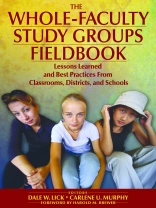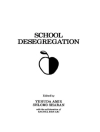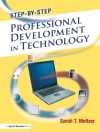Master one of today′s most successful school reform and school improvement strategies!
The Whole-Faculty Study Group (WFSG) System is a student-centered, teacher-driven process for facilitating major staff development and schoolwide change. When applied properly, it has produced extraordinary results for thousands of educators and students in schools and school districts across the country.
The Whole-Faculty Study Groups Fieldbook is a comprehensive guide to applying the WFSG process. Edited by Dale Lick and Carlene Murphy, this practical manual provides concrete strategies for implementing and sustaining a school improvement process in any environment. Offering extensive experience, each contributor explores a different aspect of Whole-Faculty Study Groups and supplies lessons learned and many first-hand examples of successful school reform and student performance enhancement. Written to complement existing resources or serve as a stand-alone guide, this book will
- Demonstrate how concepts can be applied in a variety of school improvement efforts
- Present relevant strategies and activities
- Illustrate how to use suggestions in real-world situations
- Highlight critical concepts through extensive case examples
- Provide helpful tips and lessons learned
- Explain how findings can be applied to professional learning communities
Offering numerous illustrations of the WFSG System in action and a comprehensive collection of tools for initiating and sustaining successful improvement programs, this fieldbook is an essential resource for K-12 administrators, staff developers, and teachers involved with any type of school transformation effort.
Tabla de materias
Foreword by Harold M. Brewer
Preface
Acknowledgments
About the Contributors
About the Editors
Part I: Getting Started
1. Introducing Whole-Faculty Study Groups – Carlene U. Murphy and Dale W. Lick
2. Applying the Whole-Faculty Study Groups Framework in Schools – Ann Proctor
3. Aligning Whole-Faculty Study Groups With Staff Development Standards – Michael Murphy
Part II: Leadership and Sponsorship
4. Enhancing the Principal′s Instructional Leadership Role – J. Patrick Mahon
5. Strengthening School Improvement Plans Through District Sponsorship – Anita Kissinger
6. Partnering With Teacher Unions for School Improvement – Adam Urbanski and Xochitl Perez Castillo
Part III: Study Groups and Learning Communities
7. Answering the Question: Do Professional Learning Communities Really Work? – Andrew E. Koenigs
8. Establishing Student Study Groups – Robin P. Cooper and Gwendolyn Baggett
9. Implementing Study Groups for Principals – Emily Weiskopf
Part IV: Key Success Elements
10.The Whole-Faculty Study Groups Rubric: Defining Context, Process, and Content – Carlene U. Murphy
11. Building Commitment – Kenneth Sherman and Kim Reynolds-Manglitz
12. Using Study Groups for Cultural Change in Schools – Michael L. Rothman and Ronald E. Walker
13. Changing School Culture – Jill Potts and Jeff Zoul
14. Using Data to Improve Achievement in Mathematics – Teri Roberts
15. Making Data-Based Decisions for School Success – Karl H. Clauset, Sherman H. Parker, and Marcia R. Whitney
Part V: Instructional Strategies
16. Improving the Quality of Student Performance – Steve Keyes
17. Implementing Instructional Strategies – Terri L. Jenkins and Lynn K. Baber
18. Implementing Reading and Mathematics Programs – Julie J. Nall
19. Enhancing Performance in the English Language Arts – Charlotte Ann Buisson
20. Raising Student Achievement in Reading and Mathematics – Lisa S. Smith
21. Improving Reading in Primary Grades – Angela S. Dillon
Part VI: Perspectives for Teachers and Teaching
22. Increasing Teacher Learning to Improve Student Learning – Beverly S. Strickland
23. Changing Teachers′ Beliefs About Students and Learning – Danette R. Smith
24. Creating School Successes: A Teacher′s Point-of-View – Beverly A. Gross
25. Planning and Implementing Strategies for School Improvement – Emily Weiskopf
26. Activating a Professional Teacher Evaluation Model – Jill Potts and Jeff Zoul
Part VII: State and National Initiatives
27. Going Statewide With Whole-Faculty Study Groups in Louisiana – Teri Roberts
28. Developing and Supporting Leaders: A New Day, A New Way With New Results – Deb Page and Gale Hulme
29. Improving Schools Through Statewide Collaboration – Stephen M. Preston
30. Establishing a Support Network: The National Whole-Faculty Study Groups Center – Carlene U. Murphy
Part VIII: An Overview of School Reform
31. Improving Schools: Seeing the Big Picture – Dale W. Lick and Carlene U. Murphy
References
Action Research–Related Sources
Index
Sobre el autor
Carlene U. Murphy is founder and executive director of the National WFSG Center and the principal developer of the Whole-Faculty Study Groups® system of professional development. In August 2007, she began her 50th year of work in public schools. She started her teaching career in 1957 as a fourth grade teacher in her hometown of Augusta, GA. The next year she moved to Memphis, TN where she taught for 13 years, returning to Augusta in 1972 and retiring from the district in 1993 as its director of staff development. During her 15 years as the district’s chief staff developer, the district received many accolades, including the Award for Outstanding Achievement in Professional Development from the American Association of School Administrators and Georgia’s Outstanding Staff Development Program Award for two consecutive years. She was awarded the National Staff Development Council’s Contributions to Staff Development Award and served as the National Staff Development Council’s chair of the annual national conference in Atlanta in 1986, president in 1988, and board member from 1984 to 1990. The friendships she formed and cemented during the over thirty years of her close relationship with NSDC were life-changing. After retiring from the Augusta, Georgia schools, she has worked with schools throughout the United States implementing Whole-Faculty Study Groups. She has written extensively about her work in Educational Leadership and Journal of Staff Development and has written with Dale Lick two other books about the WFSG system: Whole-Faculty Study Groups: Creating Professional Learning Communities That Target Student Learning, Corwin Press, 2005; and The Whole-Faculty Study Groups Fieldbook: Lessons Learned and Best Practices from Classrooms, Districts, and Schools (co-editor), 2007. Another book with Karl Clauset and Dale Lick, Schoolwide Action Research for Professional Learning Communities: Improving Student Learning Through the Whole-Faculty Study Groups Approach (Corwin Press, 2008), focuses on the work of study groups and gives descriptive data from schools implementing WFSG. She now lives on a small horse farm just outside of Augusta in a four generational home, which includes her husband, Joe, daughter, three grandchildren and a great-granddaughter. Even with all the activities in such a home, she still finds time to write about her work, correspond with colleagues and read about the latest developments in education.












